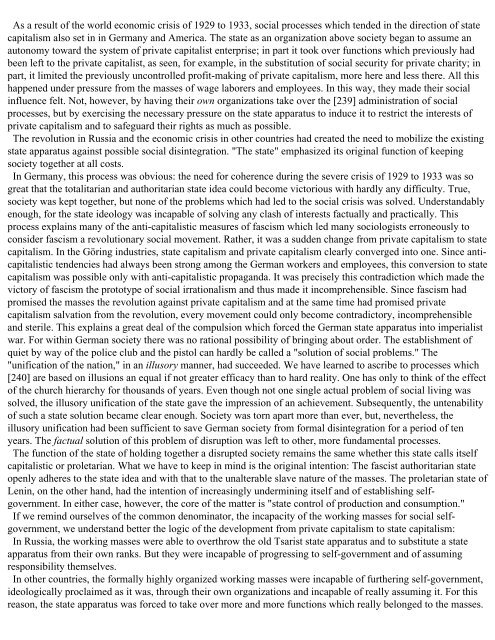The Mass Psychology of Fascism - Anxiety Depression Self-Help
The Mass Psychology of Fascism - Anxiety Depression Self-Help
The Mass Psychology of Fascism - Anxiety Depression Self-Help
Create successful ePaper yourself
Turn your PDF publications into a flip-book with our unique Google optimized e-Paper software.
As a result <strong>of</strong> the world economic crisis <strong>of</strong> 1929 to 1933, social processes which tended in the direction <strong>of</strong> state<br />
capitalism also set in in Germany and America. <strong>The</strong> state as an organization above society began to assume an<br />
autonomy toward the system <strong>of</strong> private capitalist enterprise; in part it took over functions which previously had<br />
been left to the private capitalist, as seen, for example, in the substitution <strong>of</strong> social security for private charity; in<br />
part, it limited the previously uncontrolled pr<strong>of</strong>it-making <strong>of</strong> private capitalism, more here and less there. All this<br />
happened under pressure from the masses <strong>of</strong> wage laborers and employees. In this way, they made their social<br />
influence felt. Not, however, by having their own organizations take over the [239] administration <strong>of</strong> social<br />
processes, but by exercising the necessary pressure on the state apparatus to induce it to restrict the interests <strong>of</strong><br />
private capitalism and to safeguard their rights as much as possible.<br />
<strong>The</strong> revolution in Russia and the economic crisis in other countries had created the need to mobilize the existing<br />
state apparatus against possible social disintegration. "<strong>The</strong> state" emphasized its original function <strong>of</strong> keeping<br />
society together at all costs.<br />
In Germany, this process was obvious: the need for coherence during the severe crisis <strong>of</strong> 1929 to 1933 was so<br />
great that the totalitarian and authoritarian state idea could become victorious with hardly any difficulty. True,<br />
society was kept together, but none <strong>of</strong> the problems which had led to the social crisis was solved. Understandably<br />
enough, for the state ideology was incapable <strong>of</strong> solving any clash <strong>of</strong> interests factually and practically. This<br />
process explains many <strong>of</strong> the anti-capitalistic measures <strong>of</strong> fascism which led many sociologists erroneously to<br />
consider fascism a revolutionary social movement. Rather, it was a sudden change from private capitalism to state<br />
capitalism. In the Göring industries, state capitalism and private capitalism clearly converged into one. Since anticapitalistic<br />
tendencies had always been strong among the German workers and employees, this conversion to state<br />
capitalism was possible only with anti-capitalistic propaganda. It was precisely this contradiction which made the<br />
victory <strong>of</strong> fascism the prototype <strong>of</strong> social irrationalism and thus made it incomprehensible. Since fascism had<br />
promised the masses the revolution against private capitalism and at the same time had promised private<br />
capitalism salvation from the revolution, every movement could only become contradictory, incomprehensible<br />
and sterile. This explains a great deal <strong>of</strong> the compulsion which forced the German state apparatus into imperialist<br />
war. For within German society there was no rational possibility <strong>of</strong> bringing about order. <strong>The</strong> establishment <strong>of</strong><br />
quiet by way <strong>of</strong> the police club and the pistol can hardly be called a "solution <strong>of</strong> social problems." <strong>The</strong><br />
"unification <strong>of</strong> the nation," in an illusory manner, had succeeded. We have learned to ascribe to processes which<br />
[240] are based on illusions an equal if not greater efficacy than to hard reality. One has only to think <strong>of</strong> the effect<br />
<strong>of</strong> the church hierarchy for thousands <strong>of</strong> years. Even though not one single actual problem <strong>of</strong> social living was<br />
solved, the illusory unification <strong>of</strong> the state gave the impression <strong>of</strong> an achievement. Subsequently, the untenability<br />
<strong>of</strong> such a state solution became clear enough. Society was torn apart more than ever, but, nevertheless, the<br />
illusory unification had been sufficient to save German society from formal disintegration for a period <strong>of</strong> ten<br />
years. <strong>The</strong> factual solution <strong>of</strong> this problem <strong>of</strong> disruption was left to other, more fundamental processes.<br />
<strong>The</strong> function <strong>of</strong> the state <strong>of</strong> holding together a disrupted society remains the same whether this state calls itself<br />
capitalistic or proletarian. What we have to keep in mind is the original intention: <strong>The</strong> fascist authoritarian state<br />
openly adheres to the state idea and with that to the unalterable slave nature <strong>of</strong> the masses. <strong>The</strong> proletarian state <strong>of</strong><br />
Lenin, on the other hand, had the intention <strong>of</strong> increasingly undermining itself and <strong>of</strong> establishing selfgovernment.<br />
In either case, however, the core <strong>of</strong> the matter is "state control <strong>of</strong> production and consumption."<br />
If we remind ourselves <strong>of</strong> the common denominator, the incapacity <strong>of</strong> the working masses for social selfgovernment,<br />
we understand better the logic <strong>of</strong> the development from private capitalism to state capitalism:<br />
In Russia, the working masses were able to overthrow the old Tsarist state apparatus and to substitute a state<br />
apparatus from their own ranks. But they were incapable <strong>of</strong> progressing to self-government and <strong>of</strong> assuming<br />
responsibility themselves.<br />
In other countries, the formally highly organized working masses were incapable <strong>of</strong> furthering self-government,<br />
ideologically proclaimed as it was, through their own organizations and incapable <strong>of</strong> really assuming it. For this<br />
reason, the state apparatus was forced to take over more and more functions which really belonged to the masses.


